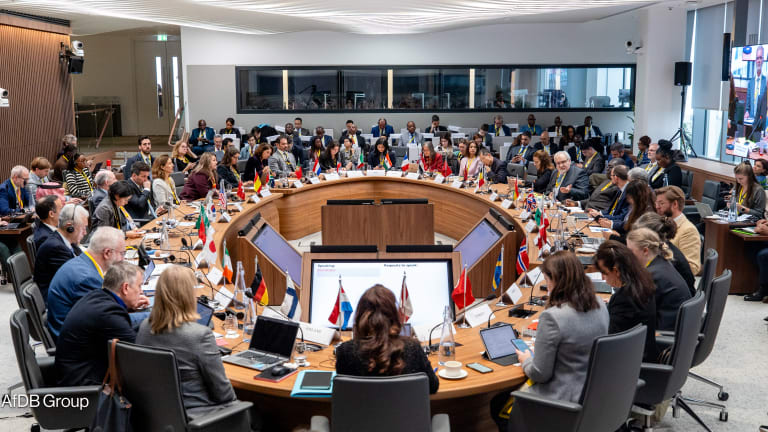
BRUSSELS — Donors pledged $2.17 billion in grants for the Lake Chad region at a conference in Berlin this week, calling for more decentralized assistance and cross-border cooperation to help more than 17 million people at the intersection of Niger, Cameroon, Nigeria, and Chad.
Dozens of countries and regional and international organizations, including the World Bank, joined members of civil society for the two-day meeting, which ended Tuesday with the United Nations praising donors’ “profoundly generous” contributions.
The top donors for “2018 and beyond” were the United States ($420.13 million), Germany ($309.3 million), and the European Commission ($269.81 million). Organizers also welcomed 13 announcements of multiyear support, making it easier to plan and implement projects, plus an additional $467 million in concessional loans from the African Development Bank, Islamic Development Bank, and World Bank.
What’s the point of UN pledging conferences?
Marcy Vigoda, head of resource mobilization at OCHA, explains when and why the U.N. decides to hold a pledging conference, why countries bother to show up, and that it’s not all about the money.
“I think the outcome if you just look at the figures is really great,” said Per Byman, managing director of the Norwegian Refugee Council Germany. “The German government was a bit worried beforehand that there might not be a lot of support and they were very happy with the financial outcome.”
Byman’s team is still analyzing the pledges to determine the split between humanitarian, peacebuilding, and development assistance; the period they are intended to cover; and whether they are all fresh announcements. He said that comparisons with last year’s conference in Oslo, which was also organized by Germany, Norway, Nigeria, and the U.N., are difficult because the $672 million raised there was only for humanitarian purposes. Ahead of this week’s meeting, NGOs told Devex of the need to better link humanitarian and development work in the region, in order to fund a more sustainable solution.
A U.N. spokesperson told Devex that the U.N. is following up with donors, with the U.N. Office for the Coordination of Humanitarian Affairs set to track humanitarian announcements, while the United Nations Development Programme will ensure development money is delivered.
The conference included a panel on “building resilience for sustainable development.” Nigeria and Chad are both pilot countries as part of the European Commission’s work on the humanitarian-development nexus.
“We agreed that a military approach will not be enough to create sustainable peace and stability,” the co-organizers reported in an outcome statement. “Resilience means going beyond simply restoring the status quo ante, which contributed to giving rise to the crisis: it means building a better standard of living than before. There is an urgent need for governments and partners to continue to scale up efforts for transformational change.”
They also welcomed the recent establishment of a governors’ forum, where local leaders from the four countries collaborate, as “an important tool for cross-border cooperation,” and stressed that “reforms are needed to pursue more effective decentralization, and reach greater geographical equity in the allocation of public resources based on national realities.”
A combination of extreme poverty, climate change, and conflict have left more than 2.4 million people displaced in the region, and more than 10 million requiring humanitarian assistance.
Byman welcomed organizers’ acknowledgment of the ongoing need for humanitarian aid, after donors told him in Niger and Cameroon in recent weeks of their eagerness to begin prioritizing development work.
“There are certainly areas we can start with more development and resilience programming,” he said. But “there are still [millions of] people in need of humanitarian assistance and in the short-to-medium term those needs will continue.”








